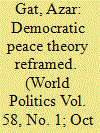|
|
|
Sort Order |
|
|
|
Items / Page
|
|
|
|
|
|
|
| Srl | Item |
| 1 |
ID:
071927


|
|
|
|
|
| Publication |
2005.
|
| Summary/Abstract |
The importance of social trust has become widely accepted in the social sciences. A number of explanations have been put forward for the stark variation in social trust among countries. Among these, participation in voluntary associations received most attention. Yet there is scant evidence that participation can lead to trust. In this article, the authors examine a variable that has not gotten the attention it deserves in the discussion about the sources of generalized trust, namely, equality. They conceptualize equality along two dimensions: economic equality and equality of opportunity. The omission of both these dimensions of equality in the social capital literature is peculiar for several reasons. First, it is obvious that the countries that score highest on social trust also rank highest on economic equality, namely, the Nordic countries, the Netherlands, and Canada. Second, these countries have put a lot of effort in creating equality of opportunity, not least in regard to their policies for public education, health care, labor market opportunities, and (more recently) gender equality. The argument for increasing social trust by reducing inequality has largely been ignored in the policy debates about social trust. Social capital research has to a large extent been used by several governments and policy organizations to send a message to people that the bad things in their society are caused by too little volunteering. The policy implications that follow from the authors' research is that the low levels of trust and social capital that plague many countries are caused by too little government action to reduce inequality. However, many countries with low levels of social trust and social capital may be stuck in what is known as a social trap. The logic of such a situation is the following. Social trust will not increase because massive social inequality prevails, but the public policies that could remedy this situation cannot be established precisely because there is a genuine lack of trust. This lack of trust concerns both "other people" and the government institutions that are needed to implement universal policies.
|
|
|
|
|
|
|
|
|
|
|
|
|
|
|
|
| 2 |
ID:
071929


|
|
|
|
|
| Publication |
2005.
|
| Summary/Abstract |
This article considers the political situation of an authoritarian province in a nationally democratic country. The objective is to uncover strategies that incumbents (in this article, governors) pursue to perpetuate provincial authoritarian regimes, as well as dynamics that can undermine such regimes. A central insight is that controlling the scope of provincial conflict (that is, the extent to which it is localized or nationalized) is a major objective of incumbents and oppositions in struggles over local democratization. Authoritarian incumbents will thus pursue "boundary control" strategies, which are played out in multiple arenas of a national territorial system. The article fleshes out these processes via comparative analysis of two conflicts over subnational democratization in 2004: the state of Oaxaca in Mexico and the province of Santiago del Estero in Argentina.
|
|
|
|
|
|
|
|
|
|
|
|
|
|
|
|
| 3 |
ID:
071928


|
|
|
|
|
| Publication |
2005.
|
| Summary/Abstract |
This article argues that the democratic peace theorists have overlooked the defining development that underlies that peace of the nineteenth and twentieth centuries: the industrial-technological revolution. Not only did that revolution make democracy on a country scale possible; it also made all the countries that experienced the revolution-democratic and nondemocratic-far less belligerent in comparison with preindustrial times. The democratic peace did not exist among premodern democratic and republican city-states, not because they were not democratic or liberal enough but because they were premodern. Other factors that have emanated from the modern transformation and may generate greater aversion to war apply mostly to liberal democratic countries while being only variably connected to their regime. Such factors include the staggering rise in the standard of living; the decrease in hardship, pain, and death; the dominance of metropolitan life and the service economy; the spread of the consumer and entertainment society; sexual promiscuity; women's franchise; and the shrinking ratio of young males in the population.
|
|
|
|
|
|
|
|
|
|
|
|
|
|
|
|
| 4 |
ID:
071930


|
|
|
|
|
| Publication |
2005.
|
| Summary/Abstract |
Research on regime change has often wound up chasing events in the post-Soviet world because it has frequently assumed that regime change, if not simple instability, implies a trajectory toward a regime-type endpoint like democracy or autocracy. A supplemental approach recognizes that regime change can be cyclic, not just progressive, regressive, or random. In fact, regime cycles are much of what we see in the postcommunist world, where some states have oscillated from autocracy toward greater democracy, then back toward more autocracy, and, with recent "colored revolutions," toward greater democracy again. An institutional logic of elite collective action, focusing on the effects of patronal presidentialism, is shown to be useful in understanding such cyclic dynamics, explaining why "revolutions" occurred between 2003 and 2005 in Ukraine, Georgia, and Kyrgyzstan but not in countries like Russia, Azerbaijan, and Uzbekistan.
|
|
|
|
|
|
|
|
|
|
|
|
|
|
|
|
| 5 |
ID:
071926


|
|
|
|
|
| Publication |
2005.
|
| Summary/Abstract |
The article explains a curious turn in European political economies. Between 1995 and 2005 national financial elites in twelve Western European countries created almost twenty competing new stock markets designed to improve financing alternatives for entrepreneurial companies. For a region supposedly averse to risk and U.S.-style capitalism, it is surprising that most of the new markets were modeled on the U.S.-based Nasdaq Stock Market, an iconic American institution. The author's structured comparisons of the new markets to one another, to previous ones, and to proposals that never saw the light of day reveal that the primary causes behind the creation, form, and timing of Europe's new markets lie in the political skills, motivations, and actions of supranational European Union bureaucrats. Challenging leading social science explanations for the cross-border convergence of domestic institutions, these findings show that the accumulated effects of day-to-day action by these supranational bureaucrats are potential causes of institutional innovation. The argument adds to a growing body of detailed empirical research on the domestic and global impact of the European regional polity and contributes to scholarly debates about market formation.
|
|
|
|
|
|
|
|
|
|
|
|
|
|
|
|
|
|
|
|
|